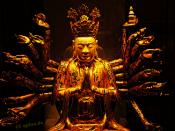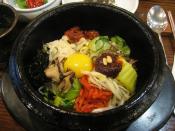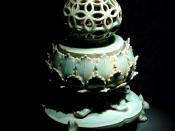The culture of Korean people is a unique blend of Chinese and Japanese influences. Korea is located between China and Japan. The name Korea comes from the early dynasty name of Koryo, meaning high and clear. The symbol comes from Korea's mountains, clear blue sky, and streams. The Korean culture differs greatly from the American society in which I am accustomed. Korean history, family life, mannerisms, religion, ethics, communication, clothing, food, holidays and rituals are vastly different from other cultures. The study of Korean culture paves the way for better business and personal relationships.
This history of Korea began with the establishment of hierarchical arrangements. Korea had developed a social order among the citizens. Early in Korea's history were four distinct social classes. The highest order among the people was the military (yangban), which married within their structures and lived apart from the other classes. The middle people (chungin) were comprised as professional people but still treated as second-class citizens.
The good or common people (yangmin/sangmin) contained mostly farmers and fishermen. The peasants or outsiders (ch'onmin) were society's outcasts, slaves, women, healers, and entertainers. Power was in the form of groups of ruling elite and they appointed kings. Social order was determined by bloodline. Later, public officials were appointed on the basis of their performance on the civil examinations. After the Japanese takeover or the Korean peninsula, Japan forced the Koreans to give up their surnames and adopt Japanese names. They also demanded that Koreans learned Japanese and forbade the use of Korean in any form. In 1948 South Korea became the Republic of Korea and North Korea declared themselves Communist. The split was based on land division at the 38th parallel. Most of the information contained in this paper is based on the culture of the citizens of South...


